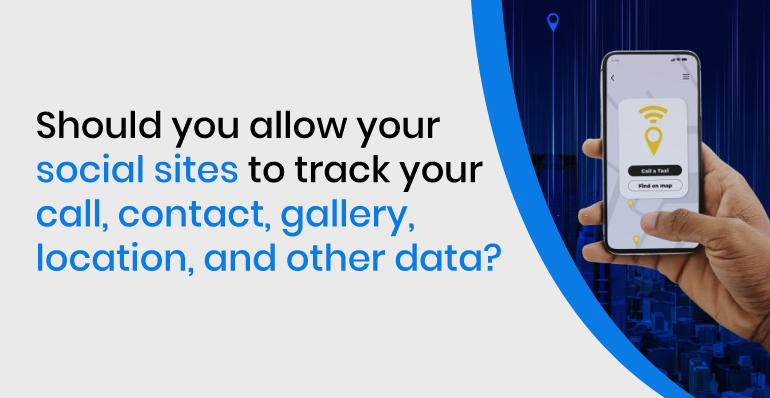Should you allow your social sites to track your call, contact, gallery, location, and other data?

Should you allow your social sites to track your call, contact, gallery, location, and other data?
If you ask me personally, you should not allow your social sites to track your call, contact, gallery, location, and other data because there are many hidden repercussions you might face that I will share with you in this blog. But the problem is if you don’t allow them to access your data, you won’t be able to use their site.
Whenever you download any social media app on your phone, they ask you to permit it to access your contacts, gallery, location, and other data. Whether or not you allow these social sites to track your data is wholly correlated to how much privacy you want in your life.

“Allow this app to access your contacts,” “Allow this app to access your location,” “Allow this app to access your photos,” “Allow this app to access your calls.” These are usually the most common permission asked by social media sites.
Without thinking any of it, we tap on allow and permit these sites to access our data. But have you ever wondered how these accesses are affecting your life, especially your privacy?
How do social sites track your data?
Most of us know that social sites have information about us. We submit our personal information like our names, hometowns, birthdays, and interests, and we assume that the social sites have our information based on the data we provide. But these social sites have much more data on us people than we realize.
Tracking your data through like, interests and interaction
Social sites can take all the data you submit and combine the data with other users and outside information to construct your tastes and preferences. It can use hundreds of data points to classify your interest and activities.
Using such as your “likes” and interaction in the social sites can tell whether you are in a relationship or going through a breakup.
Tracking your data through location
If you have location tracking turned on, it can also know where you are. If you allow these apps to track your locations, these sites collect an enormous amount of location data about where you are going, where you came from, where you live, where you work, what restaurants and businesses you tend to go to.
Then they use this information to target ads at you. Location data can also be used to reveal other people that live in your house, even if they are not connected to you on social sites.
Tracking your data through what you buy
 Social sites know that you buy when you click on ads from their respective sites. But what most people don’t realize is that these social sites have ways of tracking your offline purchases.
Social sites know that you buy when you click on ads from their respective sites. But what most people don’t realize is that these social sites have ways of tracking your offline purchases.
Social sites have partnerships with data brokers that collect about people’s purchases. For example, social sites can know about the transaction if you buy a shirt with your credit card. It can match it with the credit card you have added to your social site and start showing you ads for ties and pants.
Tracking through your contacts
On most social sites, you can see the section called “People you may know.” It suggests people you are related to or may know that you can add to your social site account.
Social sites can suggest people by using many signals of what it knows about you to determine who else you might be connected to, and this is not always from the things you share on these sites. It might be from contacts from your phones or people who have been in the same room as you.
It uses your shared contacts and location data to recommend friends. So it might suggest you people who share a doctor with you or work in the same building or exercise at the same gym.
What happens when you allow social sites to track your call, contact, gallery, location, and other data?
When you open down a most popular social media like Instagram, Facebook, Tiktok, Twitter, etc., and accept their terms and conditions, you allow them to access your microphone, call logs, photos, location. And just like that, it will have instant access to your private life.
 These social media sites create a precisely similar canvas model to you through your data. Furthermore, it will help these sites understand and know your interests, desires, choices, preferences, and actions.
These social media sites create a precisely similar canvas model to you through your data. Furthermore, it will help these sites understand and know your interests, desires, choices, preferences, and actions.
Social media sites track every clicks you make on the site, every contact detail, every location you have been to, and every picture you take. It collects your data and uses this data to use it to better target ads to its users. The more you spend time on these sites, the more they collect data from you and create a better canvas.
Let me explain to you at some points how these targeted ads catered explicitly to you can influence and manipulate your personal life.
Violate your privacy
Social media sites violate your privacy entirely as it has access to listen to your phone calls, locations settings, call logs, photos, and videos, your likes, and interests. So how secretive of a person you might be all your data is collected by your social sites whether you like it or not.
Manipulation of your thoughts
When only good things of one stuff constantly bombard you, your attitude towards that stuff changes positively even though you might have had a different feeling about it.
Social sites can use this trick to constantly show you ads that will subconsciously change your thought and belief system about a thing. This idea can be used to sell you a particular product. It can even use emotional ads as a part of smart marketing.
Purchase Habit
Have you ever had a situation when you are thinking about a bike or searching for some products, and the same product’s ad appears on your site? Social media records every data of the ad you click to purchase. Likewise, as I mentioned before, social media sites can also track the record of your offline purchases.
Social sites can use these data to know what items you purchase and then target ads similar to your purchase needs, thus increasing your purchase habit. For example, if you buy shoes, these sites can show you the complementary product ads of socks, soles, laces, and similar designer shoes.
Places you visit
Through location tracking, social sites can also manipulate the places you visit like restaurants, cinema halls, fun parks, gyms, and other areas. It collects the data you have seen before and suggests new restaurants, movie halls, parks, and other places.
Political Lineage
Social media sites even have the power to change your political beliefs and values. It can do that by targeting suitable political ads related to one party and bad political ads related to another. When you start to see only good things about a party, you begin to make a good impression.
This political influence ad can be a severe issue as Facebook CEO Mark Zuckerberg was called in for a congressional hearing to influence the 2016 US presidential election in charges of influencing people’s political beliefs. What Facebook did was target a group of people and used political ads to influence their political lineage.
Your future
Social sites do not only know who you are, where you are, and what you buy. It also can figure out what kind of things you might do in the future.
To predict life outcomes like whether you will be addicted to substances, switch political parties, whether you are physically healthy or physically unhealthy. These are the information that advertisers love to know because it helps them better target their users.
Should Social sites pay you for the data they take?
Many data researchers and even politicians nowadays argue that the big social site companies like Instagram, Facebook, Snapchat, Twitter, etc., that collect your data should pay you a remuneration.
These giant social sites take a large amount of data daily from you. Then they make a large sum of money by selling and creating ads using your data. And what do you get in return? Nothing.
The idea is simple when you allow social sites to track your call, contact, gallery, location, and other data, these sites should pay you remuneration for taking your data.
Conclusion
When you allow your social sites to track your call, contact, gallery, location, and other data, you give it the power to influence and even change your thoughts and beliefs. Social sites constantly gather data about you and your surroundings and use it to target their users better.
So if you want to live in privacy and do not want any influence from these sites, you should not allow your social sites to track your data. But if you allow these sites to track your data, there should be some legal law to provide you some remuneration in return for your data.



 WhatsApp Spy
WhatsApp Spy Facebook & Messenger Spy
Facebook & Messenger Spy Viber Spy
Viber Spy Instagram Spy
Instagram Spy Skype Spy
Skype Spy TikTok Spy
TikTok Spy Telegram Spy
Telegram Spy LinkedIn Spy
LinkedIn Spy Twitter Spy
Twitter Spy Youtube Spy
Youtube Spy Photo Spy
Photo Spy Video Spy
Video Spy Calls and Contacts Tracking
Calls and Contacts Tracking SMS & IM Chats
SMS & IM Chats Voice Capture
Voice Capture Image Capture
Image Capture Video Record
Video Record